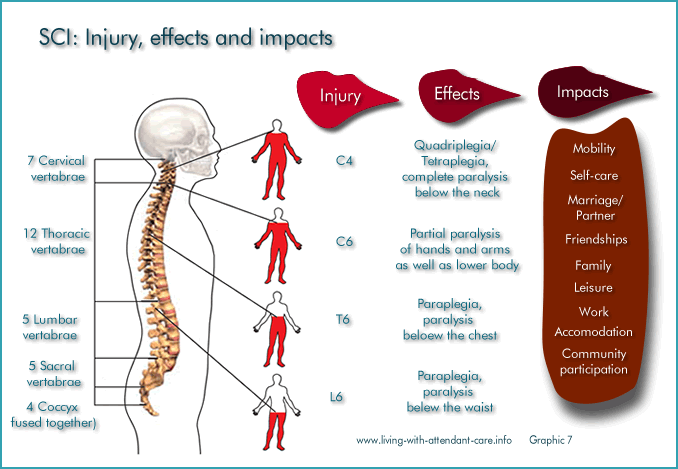- Spinal Cord Injury An introduction for people new to spinal cord injury
- What is spinal cord injury Understanding the essence of spinal cord injury
- Understanding spinal cord injury Where is the injury? C4, C6 . . .
- Injury, effects and impacts Injuries to the spine have effects on the nervous system that lead to impacts in people's lives
- Rehabilitation The rehabilitation process from injury to living in the community
- Adjusting to spinal cord injury People's experiences of having spinal cord injury
- Attendant care challenges Challenges for people with spinal cord injury receiving attendant care
Injury, effects and impacts
Injury to impacts
The location of the injury determines what part of the body is affected. For example an injury at C4 causes complete paralysis below the neck, whereas an injury at L6 causes paralysis below the waist.
The effects in turn have impacts on all aspects of the person's life.
How might having a spinal cord injury
affect me?
- Movement may be lost below the level of the injury
- Sensation may be lost below the level of injury
- Blood pressure and circulation may be altered
- Breathing may be affected
- Temperature control may be affected, including sweating and shivering
- Bladder and bowel function may be altered
- There may be spasms or involuntary movement below the level of injury
- Sexual function may be altered
- Fertility may be affected
As well as affecting your body, having a spinal cord injury can also affect the way you feel.
Many people experience, understandably, some period of distress following a spinal cord injury. Living with any medical condition increases the chance of experiencing anxiety or depression. For most people, this period of distress will settle down relatively soon after injury. If feelings of distress do persist, speak to your health professional about effective ways of managing these feelings.
Remember, all spinal cord injuries are different and what happens with one person does not necessarily happen with another.
Challenges and difficulties
Some of the challenges and difficulties are:
- Adjusting to spinal cord injury - a spinal cord injury is a major and challenging life event for you and also the people around you.
- Dealing with the psychological or emotional effects that you may experience
- Managing the transition from hospital to home
See Adjusting to spinal cord injury
Impacts on life
Physical changes
Some of the physical changes you may expect may include:
- Differences in physical functioning and mobility
- Adapting the way you manage your bladder and bowel functions
- More time being devoted to your health and well-being
- Changes in your sexual function
- Requiring assistance with everyday tasks
- New approaches to hobbies, interests and work
Practice considerations
Some of the practical considerations may be:
- A difference in your household income
- Modifications to your home environment
- Changes to your previous level of independence
- Modifications to your workplace, or consideration of a new vocation
- Managing a range of services that may be involved with you, including personal care services
Impacts on life
These have impacts on all aspects of your life:
- Mobility
- Self-care
- Marriage / Partner / Relationships
- Friendships
- Family
- Leisure
- Work
- Accommodation
- Community participation
Impacts on family
Up to 50% of families feel psychological distress in the period leading up to the discharge of their relative with SCI. However by 1 year post-discharge, this can have dropped to under 20%.
Up to 25% of partners feel as if they experience a heavy burden of care in supporting their spouse with a SCI.
Partners who marry someone with a SCI are generally more satisfied with the relationship than spouses whose partner sustained a SCI.
Over the longer term, spouses who did not have to play a significant carer role with their partner were generally less depressed
Some of the specific challenges families may deal with are:
- Isolation/Alienation
- Fatigue
- Incontinence
- Impact of carers
- Access issues
- Cost of equipment
- Home modifications,
- Community
- Impact of Pain


